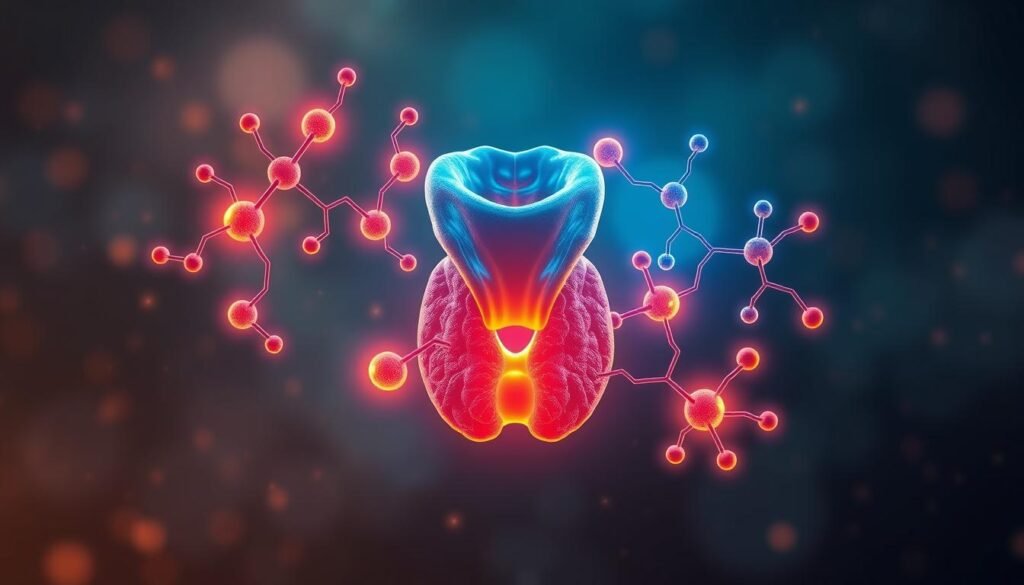An astonishing 264 million people across the globe suffer from anxiety disorders. This highlights the urgency of grasping the factors that play into anxiety. One such factor is the health of your thyroid gland. This gland regulates vital body functions, including how we feel emotionally. When it’s not working right, it can lead to feelings of anxiety and even depression. People with thyroid problems often go through a lot, like weight changes and feeling too cold or hot. This article delves into how thyroid issues and anxiety are interlinked. It shows why and how one can lead to the other.
Key Takeaways
- Anxiety disorders impact millions globally, highlighting a prevalent health concern.
- The thyroid regulates many bodily functions, including mood stability.
- Thyroid health directly influences anxiety symptoms and mental well-being.
- Common psychological symptoms from thyroid imbalances include anxiety and mood changes.
- Addressing thyroid disorders can lead to improvements in psychological health.
- Continued research is vital for understanding the thyroid-anxiety connection.
Understanding Thyroid Function
The thyroid gland is in the neck. It’s very important for hormone regulation and our health. It makes vital hormones, T3 and T4, which control our energy, heart rate, and growth.
A healthy thyroid keeps neurotransmitter levels right. This includes serotonin, which affects our mood. When thyroid hormones are off, it can cause anxiety and mood swings. This shows why we must address thyroid disorders quickly. People with unexplained anxiety should talk to doctors who know about thyroid problems.
| Thyroid Condition | Common Symptoms | Impact on Mental Health |
|---|---|---|
| Hypothyroidism | Fatigue, weight gain, depression, low energy | Increased risk of depression and cognitive issues |
| Hyperthyroidism | Weight loss, anxiety, rapid heart rate, mood swings | More anxiety and emotional ups and downs |
| Hashimoto’s disease | Fatigue, weight changes, and cold sensitivity | May lead to anxiety and depression |
| Graves’ disease | Nervousness, irritability, sleep issues | Worsens mood swings and stress |
Knowing how the thyroid affects us can help manage symptoms. This improves both mental and physical health, making life better.
What Are Thyroid Disorders?
Thyroid disorders affect the thyroid gland, vital for metabolism and hormonal balance. The main types are hypothyroidism and hyperthyroidism. Hypothyroidism makes the thyroid underactive, often due to Hashimoto’s disease. Hyperthyroidism means the thyroid is overactive, usually from Graves’ disease.
About 20 million Americans live with thyroid conditions. Yet, 60% don’t know they have it. Not knowing can lead to serious health problems since these disorders impact emotional well-being.
| Thyroid Disorder | Causes | Common Symptoms |
|---|---|---|
| Hypothyroidism | Hashimoto’s disease | Mood swings, depression, excessive stress |
| Hyperthyroidism | Graves’ disease | Panic attacks, anxiety, mood swings, sleep disturbances |
Both hypothyroidism and hyperthyroidism can have serious effects if not treated. Untreated hypothyroidism can lead to deep emotional issues like depression. Hyperthyroidism can cause panic attacks, anxiety, and trouble sleeping. Untreated hyperthyroidism also increases risks for osteoporosis and thyroid eye disease, especially in smokers. A severe thyrotoxic crisis, or thyroid storm, is a critical emergency.
The Symptoms of Hypothyroidism
It’s vital to know the symptoms of hypothyroidism for early spotting and the right treatment. This health issue shows up through various signs that greatly impact someone’s life. It can bring both body and mind problems, including anxiety. Knowing about these symptoms helps in handling them better, leading to a happier life.
Common Symptoms Including Anxiety
People with hypothyroidism might feel many things, such as:
- Fatigue
- Weight gain
- Cold intolerance
- Depression
- Unpredictable releases of thyroid hormones
A study found that about 63% of people with hypothyroidism also felt anxious. While it’s common to link depression with this condition, anxiety is a big issue too. It often shows up because of the mood changes that come after finding out you have hypothyroidism. Dealing with thyroid and anxiety symptoms together makes things more complex.
When thyroid hormone levels are low, it messes up how neurotransmitters like dopamine work. Dopamine helps control our moods. So, folks with hypothyroidism may have a higher chance of feeling anxious, which includes symptoms like:
- Insomnia
- Muscle tension
- Rapid heartbeat
- Changes in appetite
Studies show that women with hypothyroidism are 13 percent more likely to feel anxious than those without it. Even when thyroid levels get back to normal with treatments like Synthroid (levothyroxine), the risk of anxiety doesn’t fully go away. This makes following treatment plans harder, which adds more challenges in managing health.
Dealing with anxiety the right way can make a big difference in treatment results. Using therapies, mindfulness, and SSRIs can help people manage hypothyroidism and anxiety. It’s crucial for doctors to keep a close watch and adjust treatments as needed for both issues.
The Symptoms of Hyperthyroidism
Hyperthyroidism speeds up metabolism and leads to many symptoms. Anxiety from hyperthyroidism is a common effect. People may notice faster heartbeats, weight loss without trying, and feeling more nervous or easily upset. These signs are often mistaken for normal stress or anxiety. This mix-up shows why knowing the link between thyroid and anxiety symptoms is crucial.
Identifying Anxiety and Mood Changes
Those with hyperthyroidism often feel unusually anxious. The problem can get worse as the thyroid condition does. They might feel their heart racing, get tired easily, or feel overwhelmed. These hyperthyroidism symptoms can shake up someone’s emotions a lot. They need close watching and help.
Understanding these mood swings is key. Many people first seek help for their anxiety. They don’t know it’s actually a thyroid issue. A full check-up is needed to avoid wrong diagnoses and get the right treatment. For deeper insights, check out this source.
Also, it’s important to see the emotional drain anxiety from hyperthyroidism causes. Those with thyroid and anxiety symptoms can end up in a tough cycle of worry. This makes finding out what’s really wrong and managing it harder.
| Symptoms | Description |
|---|---|
| Increased Heart Rate | A faster heartbeat that can lead to feelings of anxiety and discomfort. |
| Weight Loss | Unintended weight loss, often accompanied by increased appetite. |
| Excessive Sweating | Increased perspiration leading to discomfort and potential social anxieties. |
| Irritability | Increased feelings of frustration and irritability throughout the day. |
| Trouble Sleeping | Insomnia or disturbances in sleep patterns, exacerbating anxiety. |
Can Thyroid Cause Anxiety?
Many studies have shown a link between thyroid problems and anxiety. For those with Graves’ disease, 18% have anxiety. This is more than the 13% in people with nodular goitre. This shows a clear thyroid anxiety connection. Anxiety in Graves’ disease patients is much higher than in those with nodular goitre, statistically significant (p = 0.008).
Anxiety isn’t the only issue; there’s also a higher chance of depression. 10% of Graves’ disease sufferers face depression compared to 4% with nodular goitre (p = 0.038). These issues can worsen when other conditions are also present. This makes symptoms of both anxiety and depression more severe (anxiety p = 0.04, depression p = 0.01).
How long someone has Graves’ disease affects their anxiety levels. As the condition lasts longer, anxiety gets worse (p = 0.04). This shows that not treating thyroid problems can make mental health worse.
Hypothyroidism raises the risk of anxiety too. Those with it are twice as likely to get anxious compared to others. About 30% of anxiety disorders are linked to autoimmune thyroid problems. In hypothyroidism cases, 70% of men and over 92% of women report anxiety symptoms. This shows how important it is to check for thyroid issues when dealing with mental health.
Hyperthyroidism can also cause anxiety, leading to nervousness and irritability. This is due to too much thyroid hormone affecting the brain. Specially, postpartum thyroiditis can change moods heavily by shifting from hyperthyroidism to hypothyroidism.
It’s key to spot the possible connection between thyroid issues and anxiety. If someone has physical and anxiety symptoms, they should get checked quickly. Treating the thyroid problem can greatly help with mental and emotional health.
Thyroid Hormones and Neurotransmitter Regulation
Thyroid hormones are vital for brain health. They help control neurotransmitter production. Serotonin, important for mood, is one such neurotransmitter.
When thyroid hormone levels fluctuate, serotonin levels can change. This can cause anxiety and depression. It shows how important the thyroid is for mood stability.
The Role of Serotonin in Mood Stability
Serotonin levels affect our mood. Low serotonin can cause mood disorders. If thyroid hormones are low, serotonin production can drop. This leads to sadness and lack of interest.
Hypothyroidism can cause depression and brain fog. It proves how critical thyroid function is to mood. On the other hand, too much thyroid hormone can make people anxious and irritable.
This connection between thyroid hormones and mood is essential. It helps in treating thyroid issues and mood disorders. We must understand this link well.

Thyroid and Mental Health
There’s a key link between thyroid health and mental well-being. People with thyroid problems often face emotional issues. They report mood swings, anxiety, and depression. Studies show that the impact on mental health, especially from hypothyroidism, is quite large. Depression is a major issue, common in these patients. It is often hard to treat in this group.
Those with hypothyroidism mainly get diagnosed with major depressive disorder. Anxiety and bipolar disorder can also appear if thyroid hormone levels are off. Deep hypothyroidism might cause myxedema psychosis, which leads to deep depression and brain function issues. The early signs of hypothyroidism include feeling more anxious and a drop in thinking clearly. Checking thyroid levels is key to managing these problems well.
Thyroid hormones play a big role in how our brain works. They affect mood-regulating chemicals like serotonin, dopamine, and norepinephrine. When someone has hypothyroidism, this balance gets disturbed, causing anxiety and mood issues. Using synthetic hormones and making lifestyle changes can help fix this and boost mental health.
| Thyroid Disorder | Associated Mental Health Issues |
|---|---|
| Hypothyroidism | Major depressive disorder, anxiety disorders, cognitive impairment |
| Severe Hypothyroidism | Myxedema psychosis |
| Bipolar Disorder | Increased likelihood with thyroid dysfunction |
| Hyperthyroidism | Increased anxiety, mood disturbances |
It’s important to treat both body and mind when dealing with thyroid disorders. Doing things like exercising and eating well can boost mental health. This shows how connected our physical and mental health are. Understanding these impacts can improve treatment and help those affected live better.
Anxiety from Thyroid Imbalance
Thyroid imbalances greatly affect our minds, especially our anxiety levels. When our hormone levels fluctuate, we often find it hard to stay emotionally stable. People might experience fast thoughts and panic attacks, leading to what is known as “brain fog.” This emotional stress makes anxiety worse, due to changing energy and physical symptoms.
Psychological Effects of Thyroid Disorders
More than 20 million Americans have thyroid issues, but many do not know it. Women are at a higher risk, being 5 to 8 times more likely to have these problems. Anxiety from thyroid problems affects everyone, no matter the type. Hyperthyroidism can make you feel restless and irritable. Hypothyroidism might make you feel depressed and tired.
Up to 63% of people with low thyroid function feel anxious. Those with slight thyroid issues face a high risk of depression, with 4-40% affected. This link between thyroid function and mood shows why regular checks and mental support are key.
Just treating medically may not be enough for anxiety. A mix of psychological help and medicine works best. Understanding how thyroid function impacts our feelings is crucial. To learn more about thyroid health and mental well-being, click here.

Diagnosis of Thyroid Disorders
Diagnosis starts with blood tests for thyroid function. It measures levels of hormones like T3 and T4, along with Thyroid-Stimulating Hormone (TSH). These tests are key for finding conditions like hypothyroidism and hyperthyroidism.
Many with thyroid issues don’t know they have them. Up to 60% might not get the right diagnosis. This can cause confusion, especially when symptoms look like mental health issues.
Healthcare providers look at many things when checking thyroid health. This includes:
- Symptoms the patient reports
- Their family’s medical history
- Life habits, like stress and diet
For low thyroid hormone levels, doctors check TSH and T4. For high levels, they might do iodine tests. These steps are vital for the right diagnosis.
Finding and treating thyroid disorders is important. It can greatly help manage any anxiety. Treatment plans consider both hormone levels and mental health.
Diagnosing thyroid disorders is about more than easing symptoms. Accurate diagnosis leads to the right treatment. This helps people feel better, both physically and mentally.
Treatment for Thyroid Disorders and Associated Anxiety
Treating thyroid disorders improves life quality. Effective thyroid treatment options aim to normalize hormone levels. This can mean replacing missing hormones in hypothyroidism or suppressing too much in hyperthyroidism. Such treatments address physical symptoms and help manage anxiety with thyroid condition.

Recognizing both physical and psychological therapies is key. Psychological methods, like cognitive behavioral therapy, help in understanding and managing the condition. Support groups and lifestyle changes, like stress reduction and exercise, ease emotional struggles for thyroid patients.
A lot of people with thyroid issues also feel anxious or depressed. Around 60% of those with hypothyroidism feel anxious. Knowing this connection helps treat patients better, using holistic strategies that include various thyroid treatment options.
| Thyroid Condition | % of Affected Individuals | Associated Anxiety Symptoms |
|---|---|---|
| Hypothyroidism | 80% of thyroid disorders | 60% experience anxiety |
| Hyperthyroidism | 20% of thyroid disorders | 60% experience anxiety |
Checking thyroid hormone levels regularly is crucial, especially if taking psychiatric drugs. Drugs for bipolar disorder can affect the thyroid, which may lead to mood swings from hormonal changes. Working with healthcare teams helps manage these issues and maintain emotional well-being.
Conclusion
The link between thyroid function and mental well-being is clearer now. Getting the right diagnosis and treatment for thyroid issues can greatly improve emotional health. This leads to a better journey in thyroid disorder recovery. Research shows that people with thyroid problems often feel more anxious and depressed. This highlights the importance of getting help early on.
Research points out that many with thyroid problems also face anxiety and depression. Women are especially likely to experience these issues. It’s crucial for anyone with symptoms to get professional advice. This can lead to managing anxiety effectively. With the right medical care, a lot of people see a big improvement in their lives. It proves how important good thyroid health is for feeling well.
Recovering emotionally can take time, but it’s worth it. Knowing about thyroid issues and their effect on mental health helps a lot. It can make life better. For more information, check out this study on psychiatric disorders and thyroid problems.